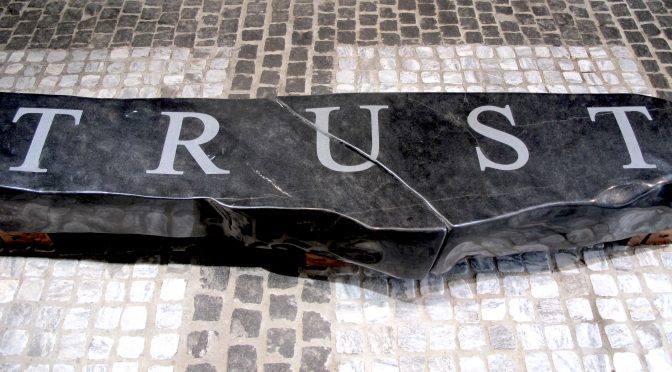Look to a dictionary definition and you’ll find something that says:
a firm belief in the reliability, truth, ability, or strength of someone or something
synonyms for trust would be words like belief, faith, certainty, assurance, conviction, credence and reliance.
Trust relates to so many aspects of our daily lives, that we take it for granted without really acknowledging that we depend heavily on it.
A trust in our parents, our teachers, our siblings, colleagues, employer, government. We even have an element of trust that relates to ourselves. In many contexts, there is and always has been a strong reliance on data. One needs to look to whether one can honestly rely on a particular piece of data and trust in it.
So just how do we build and maintain that trust?
Some people are slow to believe in and to trust in their environment. Sometimes, that lack of trust is based on past experience, sometimes it is based on education, sometimes it is just an innate part of their DNA and psychological makeup.
Are you, a audentes Fortuna adiuvat or ‘fortune favours the bold’ person?
Someone who “tombstones” into the world like one of those cliff divers plunging from an incredible height into the sea? In reality, though it seems difficult to discern, their timing is actually quite precise, the jump is measured and the right time to go is assessed. They don’t just jump randomly. They do have trust and have faith that at the moment they start to fall, that they timed it perfectly, just as the waves swell and crash into the jagged rocks below. We see the tombstoners as careless and reckless but do we ever think of their faith and trust?
Speaking for myself, I am probably a little in the cautious camp – not distrustful per se but tempered in my expectations. I usually have a degree of trust in people, systems and process, especially if they are established. Established is the key word here, I will come back to that.
If I see a context that squarely lines up with something I have seen before either positively or negatively then, of course, my disposition is influenced already. This extends to not just individuals when I first meet them but also products and the whole environment like a visit to a new city or country. Trust has strong parallels with positivism I think. The proverbial ‘glass half full vs. glass half empty’.
If you feel uncomfortable about something or someone though, what do you ultimately do? I believe that most of us would probably embark on a journey of discovery – one where we try to establish whether what we are seeing, experiencing or sensing, is biased, skewed or where some redeeming aspect is possibly overlooked. We do some research and determine how ‘established’ that thing, place or person is – do enough research and you can come up with enough information to reassure you or dissuade you from engaging further.
Why do we do this? The answer in my mind is pretty simple. When we don’t trust something it weighs on us and consumes unnecessary cycles of thinking and attention when in reality we could be better spending that time and effort on being more productive or creative. Trust ultimately means relying on someone else or something. If you have no trust in that thing or person then you are putting yourself at some level of risk.
I take public transport almost every day, I trust that the journey will be a safe one. If the bus or train driver is erratic then my trust is compromised. I trust that my child will get to school on that same bus or train and at school, will be safely educated. That they will study hard and will grow up to be a productive member of society. If I see or hear or experience something that goes awry or contrary to my expectations then my trust is compromised. I’ll have to do something to change that. Take a different route, switch schools, guide and monitor the child, whatever – there are many things I could do differently but I cannot stay on the same course hoping it will remediate itself.
Though we often don’t think about the erratic driving, the absenteeism, the failing grades and the abnormal behaviour and anecdotes on events as data, in reality, they are. Everything that feeds into us sensorily or cognitively becomes part of a pool of measures and data-points that are our “trust database”.
The question that one should ask oneself is this. When you lose trust or faith, how is it re-gained or rebuilt and should we bother, or instead move on to someone or something else. Sometimes you are too far down a particular journey to turn back.
Other times you may need to retrace your steps and take a different fork in the road.
About the picture:
I love this picture, I have experienced something similar to it in other places. The narrative of the artist from my homeland gives an interesting perspective. In his own words:
For me, making the work, and sitting on it, is one way of getting over the things that have tripped me up and more importantly, of getting over myself.
Read more at the Willem Boshoff Archive

2 thoughts on “Who and what do you trust?”